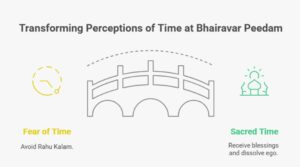Among the many deities in Hindu tradition, Bairavar Ride a Dog is a powerful image that stands out, with Lord Bairavar known not only for his fierce form and role as the guardian of time, but also for his unusual mount: the dog. In contrast to the grandeur of Garuda, the nobility of Nandi, or the cleverness of Mooshika, Bairavar’s choice of vahana is often misunderstood. But there is profound symbolism in this selection, rooted in ancient spiritual meaning and cultural context.
In traditional Indian society, dogs have long been seen as protectors. They watch over village boundaries, stand guard at night, and alert humans to unseen threats. This natural instinct aligns perfectly with Bairavar Ride a Dog as the guardian of space, time, and cosmic order. As the protector of temples, sacred spaces, and even the gates of cremation grounds, Bairavar is often invoked to guard both the physical and the spiritual.
The dog, with its alertness and loyalty, becomes the ideal companion for this task. It sees what we cannot. It senses what we ignore and it reacts to energies we are blind to. In this way, the dog becomes more than just a vahana, it is a spiritual symbol of unwavering vigilance.

The dog also represents absolute loyalty. This is not merely about being faithful to another but also about being true to one’s dharma, one’s inner duty. Bairavar Ride a Dog signifies the alignment of divine purpose with loyalty to truth.
On a deeper level, the dog can be seen as a representation of inner awareness. Just as a guard dog remains alert and awake, a spiritual seeker must remain aware of their thoughts, emotions, and actions. Bairavar’s symbolism reminds us to stay watchful, to guard our inner world as carefully as we do the outer.
In many spiritual traditions, dogs are believed to perceive what is hidden – subtle energies, spiritual disturbances, and even souls. This idea is echoed in the role of Bairavar as the lord of cremation grounds, where the physical and metaphysical worlds meet. His association with death, transition, and protection from dark forces makes the dog a fitting companion.
This connection to the invisible also suggests that Bairavar’s presence and his dog’s presence helps protect us from unseen spiritual harm. For this reason, many devotees offer food to stray dogs as an indirect form of worship, especially on days sacred to Bairavar, such as Ashtami.
One of the most powerful messages in Bairavar’s choice of vahana is the elevation of the humble. The dog, often seen as unclean or lowly in traditional hierarchies, is placed beside a fierce divine protector. This challenges social biases and reminds us that divinity does not reside only in grandeur. The sacred often arrives in the simplest forms.
Bairavar teaches us to look beyond appearances, to find value where others see none, and to recognize that spiritual strength often hides in humble forms.

We offer various sacred rituals including Abhishekam, Homams, and personalized pooja services to help devotees connect deeply with Lord Bhairava’s divine energy.
Copyright © 2025 All Rights Reserved
Copyright © 2025 All Rights Reserved